Marcia Thornton Jones's Blog, page 87
February 11, 2020
Writing Like a Racecar Driver by Jody Feldman
 What do I know about the racecar scene? About as much as I learned from watching the very excellent movie, Ford vs. Ferrari. Don’t let the title nor any preconceived notions stop you from seeing it. This is not your basic driving/racing/hero/villain flick. It’s much more layered and nuanced, with excellent character profiles and sharp storytelling. And it’s based on a significant piece of racing history.
What do I know about the racecar scene? About as much as I learned from watching the very excellent movie, Ford vs. Ferrari. Don’t let the title nor any preconceived notions stop you from seeing it. This is not your basic driving/racing/hero/villain flick. It’s much more layered and nuanced, with excellent character profiles and sharp storytelling. And it’s based on a significant piece of racing history.One other thing struck me about the story – and we are now segueing into our February theme, how we start. And that centers on racecar driver Ken Miles’s passion for his craft. Sure, he was a skilled driver; he could go faster than fast, but he could also pinpoint any issue and know exactly how to fix it by simply listening. Ken Miles didn’t just jump behind the steering wheel, ready to speed around the track again and again and again. What made him a legend was his vast knowledge and his depth of preparation.
Yes, you saw that metaphor coming from the distant horizon.
When I start the process of writing a new book – even though I tend to be a plunger – the plunge doesn’t happen until I have copious notes and ideas and diagrams and until I have a solid theme to guide my writing. I come to understand the characters deeply enough to know what kind of pizza they’d order, to know what embarrassing object they may have stashed and where they’re hiding it. I don’t take the time to go through a character questionnaire, but if you asked me anything about them, I could answer.
If my creative engines start revving prematurely (and I do tend to get overexcited about plotting) I hold myself back from writing until I know what the stakes are and how they relate to the theme. I need to know backstories on every character and how they play in to the plot. I need to know what the main character wants, why the MC wants it and what’s in the way of achieving that. Before a word goes down, I need to hear the MC narrating that first sentence to me. And when that first sentence hums like a finely tuned racecar, I’m off and running.
Maybe too fast.
But try and stop me.
Published on February 11, 2020 03:00
February 8, 2020
WHEN'S BREAKFAST? -- by Jane Kelley
My father grew up on a farm in Indiana. He insisted on eggs for breakfast and so the rest of us had to have them too. Mom cooked them different ways. But whether they were scrambled, soft boiled, or sunny side up, I couldn't eat them.
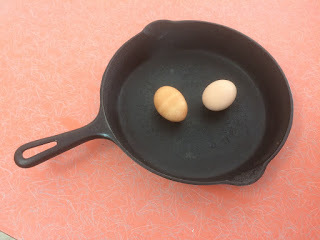
I was a reluctant riser. Each morning, by the time I dragged myself to the table, the hot breakfast was cold and unappealing. Mom yelled. I cried. I forced down a few bites before dashing to the school bus. Was it any wonder that I hated eggs?
But here's the thing. I don't really hate eggs. I love to eat them––just not for breakfast. I love breakfast––just not in the morning.
There's a lesson here for writers. Sometimes the moment may not be right for what we're serving.
Just the other day, I read a New York Times article about Claude McKay's novel Romance in Marseille. According to article, the novel contains themes like "queerness, the legacy of slavery, postcolonial African identity that are among those at the forefront of literature today." But those themes weren't acceptable then, so the novel didn't get published for 87 years.
That's decades! That's longer than I expect to live! (Although those mornings shoving yellow bits around my plate certainly felt like they lasted forever.)
So then how do we know if we should persist with a project? How can we predict the future? Well, we can't. There's a difference between serving up eggs and words. Whatever we write will keep––a month, a year, a decade––until we return to it as a wiser person and a better writer. And sometimes, as is true for my current project, the news can make it topical and solve a pesky little plot problem.
Do not despair. Do not give up. Just be prepared to be patient. Keep your eyes open for changes in the world and in yourself-–and for new things to be passionate about. That's important. You'll need to write something else while you're waiting for someone's appetite to awaken.

I was a reluctant riser. Each morning, by the time I dragged myself to the table, the hot breakfast was cold and unappealing. Mom yelled. I cried. I forced down a few bites before dashing to the school bus. Was it any wonder that I hated eggs?
But here's the thing. I don't really hate eggs. I love to eat them––just not for breakfast. I love breakfast––just not in the morning.
There's a lesson here for writers. Sometimes the moment may not be right for what we're serving.
Just the other day, I read a New York Times article about Claude McKay's novel Romance in Marseille. According to article, the novel contains themes like "queerness, the legacy of slavery, postcolonial African identity that are among those at the forefront of literature today." But those themes weren't acceptable then, so the novel didn't get published for 87 years.
That's decades! That's longer than I expect to live! (Although those mornings shoving yellow bits around my plate certainly felt like they lasted forever.)
So then how do we know if we should persist with a project? How can we predict the future? Well, we can't. There's a difference between serving up eggs and words. Whatever we write will keep––a month, a year, a decade––until we return to it as a wiser person and a better writer. And sometimes, as is true for my current project, the news can make it topical and solve a pesky little plot problem.
Do not despair. Do not give up. Just be prepared to be patient. Keep your eyes open for changes in the world and in yourself-–and for new things to be passionate about. That's important. You'll need to write something else while you're waiting for someone's appetite to awaken.
Published on February 08, 2020 06:00
February 3, 2020
Hello, DICTIONARY FOR A BETTER WORLD!
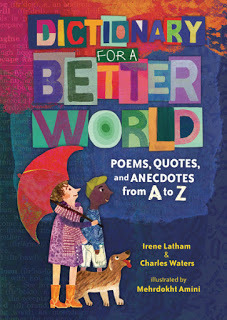 My latest book DICTIONARY FOR A BETTER WORLD: Poems, Quotes and Anecdotes by Irene Latham and Charles Waters, illus. by Mehrdokht Amini, published by Lerner, will be available starting tomorrow Feb. 4. Yay!
My latest book DICTIONARY FOR A BETTER WORLD: Poems, Quotes and Anecdotes by Irene Latham and Charles Waters, illus. by Mehrdokht Amini, published by Lerner, will be available starting tomorrow Feb. 4. Yay!Reviews:
"Forms range from the aubade to the villanelle, each explained in a brief caption. Latham and Water’s personal stories are plainspoken and relatable, and the suggested actions, accessible." - Publisher's Weekly, STARRED
"this inclusive, thought-provoking anthology offers a number of entry points for exploring concepts and issues related to identity, social justice, and making a difference." Recommended. - School Library Journal
"A creative and inspirational resource suitable for a broad range of ages and uses." - Kirkus
Resources:
DICTIONARY Discussion Guide, created by Zestlan Simmons, 2019 Alabama Teacher of the Year
Q & A about DICTIONARY with Irene Latham & Charles Waters
Happy reading!
Published on February 03, 2020 03:30
February 1, 2020
Smack Dab News
KIRKUS REVIEW:WISHES, DARES, AND HOW TO STAND UP TO A BULLY by Darlene Beck Jacobson
Review Issue Date: February 15, 2020
Online Publish Date: January 21, 2020
Publisher:Creston
Pages: 275
Price ( Hardcover ): $17.99
Publication Date: April 7, 2020
ISBN ( Hardcover ): 978-1-939547-62-0
Category: Fiction
With his father missing in action in Vietnam, 11-year-old Jack faces a long, lonely summer at his grandparents' home. While the enthusiasm for life his younger sister, Katy, displays does much to lift his spirits, it's the companionship of his new friend, Jill, that makes all the difference. She's dealing with major problems of her own. Ever since their mother recently struck up a dysfunctional relationship with a manipulative man, Jill's brother, Cody, has turned into a severe bully. Jack and Jill, apparently white, become convinced that the wishes they make over a one-eyed fish they repeatedly catch have real power—but a badly worded wish can seemingly have devastating consequences. Jack's afraid to wish for his father's return from war for fear he might come home dead. Jill's tentative wishes to resolve Cody's nastiness only gradually reveal the true nature of the boy's problems and what the real solution involves. The tale is related in free verse, short lines and spare prose cascading narrowly down the pages, conveying a powerful message of bully management: "Bullies need our permission to / rule over us." This realization is enhanced by insight Jack's own dad provides through a boyhood diary, suggesting that even bullies might need friendship. Although it's set in the 1960s, the story reflects timeless issues that will resonate with modern readers. A fresh, inspiring exploration of a daunting issue. (Historical verse fiction. 9-12)
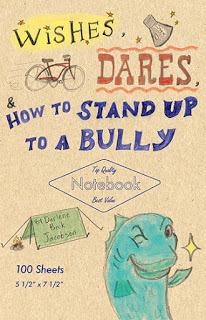
Just days shy of its release 12 years ago...
The Gollywhopper Games is finally coming out in audio! The two others in the series will soon follow. Thanks, Recorded Books!

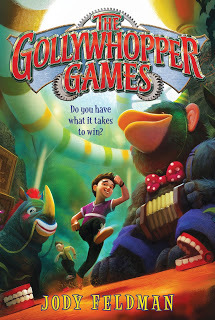
--
Published on February 01, 2020 01:00
January 30, 2020
The First Time I… (Holly Schindler)
This month’s theme keeps making me think of teaching music.
That’s how I paid the bills during my earliest days of writing. As I was drafting those first attempts at novels, I was teaching piano and guitar lessons out of my home. It was the perfect setup: get up in the morning, write until 3:00 (when the kids got out of school), then teach lessons for a few hours, until dinnertime.
The thing that struck me the most about teaching music was the pervasive belief so many of my students had that if it didn’t come easily or quickly, it wasn’t for them.
Music, they assumed, required an innate gift. You were born with it, or you weren’t. That first scale or song or chord needed to be perfect. If not, they were never going to be musicians. Ever.
It completely blew me over. Every single time I came across it. I even come to think of as the myth of talent. At times, it sure seemed it does far more harm than good.
I vaguely remember an article I bumped into somewhere in which the author contended that there was no such thing as a child prodigy—the one we all immediately think of when we hear the term, the kid who just popped into the world automatically knowing how to drive a golf ball or play a concerto. The author’s hypothesis was that what that kid really had was interest. He / she paid attention. And there was a strong desire that went into it, of course, that kind of mildly obsessive component that kept driving them back to the same activity.
That article stayed with me. Mostly because I think there’s something to it. I was often told, through school, I had a “talent” for writing. I loved books. I loved storytelling. I graduated with a creative master’s in English. And yet, it still took seven and a half years to sell that first novel. (Not a typo.) In the end, what was more important—any raw talent I might have had, or a work ethic? The desire to get better?
Clearly, if you’ve got to choose, determination and stamina and a willingness to work always beats out raw talent.
So often, we ask the question, “Got an idea for a book?” and offer advice on how to get it on paper. But what happens if you’ve got a draft and it’s awful? Or didn’t sell?
So what? Write it again. Write another book. Keep going.
Don’t decide, after playing one clumsy song, that you’ll never play the piano well.
After all, the first time I ever tried anything, the results were lopsided and disastrous.
…even writing.
Published on January 30, 2020 01:00
January 29, 2020
Nothing Like The First...
By Charlotte Bennardo
One of the themes this month is about mentoring. Honestly, I can't say a single individual has mentored me. Yes, there have been those who've encouraged me, and author organizations which created resources for writers, and those in the business I've asked for advice. But that's not the same as mentoring.
So that leaves the other theme of "The first time I..."
As a multi-decade writer, there are a lot of firsts. I'm grateful to have achieved a number of them:
Getting a job as a newspaper reporter/photographer then seeing my articles and photos in printGetting that call from an editor who wanted to publish SirenzAppearing at Book Expo America, and seeing over 300 people lined up, waiting for a copy of SirenzHearing from fans who loved SirenzGetting a gift from a fanFinding an agentBecoming a member/committee member of the NJ SCBWIGoing to NYC for the SCBWI annual conferenceMeeting so many authors and agentsHaving an agent (not mine) say, "I read your book."Seeing Sirenz, Sirenz Back in Fashion, and Blonde OPS in bookstoresGetting shutdown notices of my browser from the FBI because of the research I was doing for Blonde OPSGetting roasted in a review that was so vitriolic, the org had to post an opposing viewpoint for balanceDedicating my books to those special people in my lifeIndie publishing my Evolution Revolution trilogy and it getting awardsHaving a launch party for SirenzMeeting famous writersGetting dumped by an agent. And an editorHaving books go out of printHaving Sirenz stolen out of the library (which, to me is a compliment)Beating Dr Suess in the number of rejections for 1 book (he had 50, I stopped counting at 60)Going to a book festival/signing/event and NO ONE shows upI'm sure I could list more, but you see that an author's life is a combination of both good and terrible firsts. Just something to keep in mind when you see only the 'glamour' (ha ha) and not the reality. If you're a beginning/aspiring writer, don't let the bad outweigh the good, and if you're an established writer, hey, we're all simpatico to each others' disappointments. If you're a reader, there is an unpleasant underside when we create art and put ourselves out there, so be kind if you don't like the book, and be a hero and post/talk about a midlist writer.
One of the themes this month is about mentoring. Honestly, I can't say a single individual has mentored me. Yes, there have been those who've encouraged me, and author organizations which created resources for writers, and those in the business I've asked for advice. But that's not the same as mentoring.
So that leaves the other theme of "The first time I..."
As a multi-decade writer, there are a lot of firsts. I'm grateful to have achieved a number of them:
Getting a job as a newspaper reporter/photographer then seeing my articles and photos in printGetting that call from an editor who wanted to publish SirenzAppearing at Book Expo America, and seeing over 300 people lined up, waiting for a copy of SirenzHearing from fans who loved SirenzGetting a gift from a fanFinding an agentBecoming a member/committee member of the NJ SCBWIGoing to NYC for the SCBWI annual conferenceMeeting so many authors and agentsHaving an agent (not mine) say, "I read your book."Seeing Sirenz, Sirenz Back in Fashion, and Blonde OPS in bookstoresGetting shutdown notices of my browser from the FBI because of the research I was doing for Blonde OPSGetting roasted in a review that was so vitriolic, the org had to post an opposing viewpoint for balanceDedicating my books to those special people in my lifeIndie publishing my Evolution Revolution trilogy and it getting awardsHaving a launch party for SirenzMeeting famous writersGetting dumped by an agent. And an editorHaving books go out of printHaving Sirenz stolen out of the library (which, to me is a compliment)Beating Dr Suess in the number of rejections for 1 book (he had 50, I stopped counting at 60)Going to a book festival/signing/event and NO ONE shows upI'm sure I could list more, but you see that an author's life is a combination of both good and terrible firsts. Just something to keep in mind when you see only the 'glamour' (ha ha) and not the reality. If you're a beginning/aspiring writer, don't let the bad outweigh the good, and if you're an established writer, hey, we're all simpatico to each others' disappointments. If you're a reader, there is an unpleasant underside when we create art and put ourselves out there, so be kind if you don't like the book, and be a hero and post/talk about a midlist writer.
Published on January 29, 2020 18:32
January 27, 2020
A First Time for Everything
I find that a lot of writers are like I used to be in that they're apologetic about what they haven't done.
"I haven't published a novel."
"I haven't ever published a story."
"I've never written fiction before."
"I've don't write nonfiction."
"No one's ever invited me to present at a conference."
"It's not like I'm on any bestseller lists."
"My books don't have any writing awards."
The list goes on.
In stacking up a list of the things we haven't done, we de-legitimize ourselves.
But guess what?
The writers who have done all the things you haven't done...hadn't done them either...until they did them!
So in 2020, I challenge you to add one little, three-letter word to your "never have I ever" writing statements: the word YET.
Maybe you haven't finished a novel YET. Or published a nonfiction YET. But that doesn't mean you never will.
And after the first time of finally doing the thing you've never done, you've done it!
Here's to all your successes that are yet to be in the new decade!
Ginger Rue is the author of the Aleca Zamm series from Aladdin and the Tig Ripley series from Sleeping Bear.
"I haven't published a novel."
"I haven't ever published a story."
"I've never written fiction before."
"I've don't write nonfiction."
"No one's ever invited me to present at a conference."
"It's not like I'm on any bestseller lists."
"My books don't have any writing awards."
The list goes on.
In stacking up a list of the things we haven't done, we de-legitimize ourselves.
But guess what?
The writers who have done all the things you haven't done...hadn't done them either...until they did them!
So in 2020, I challenge you to add one little, three-letter word to your "never have I ever" writing statements: the word YET.
Maybe you haven't finished a novel YET. Or published a nonfiction YET. But that doesn't mean you never will.
And after the first time of finally doing the thing you've never done, you've done it!
Here's to all your successes that are yet to be in the new decade!
Ginger Rue is the author of the Aleca Zamm series from Aladdin and the Tig Ripley series from Sleeping Bear.
Published on January 27, 2020 22:00
January 20, 2020
My Favorite Mentors
A popular question I'm asked at school visits is, "What inspired you to become a children's author?" My answer is simple. "All the authors I love to read." And for this month's post, I'm going to highlight three of my favorites. They aren't mentors in the sense that I was their protégé, but they are mentors in the sense that their writing molded and shaped who I became as a writer because I admired their work and learned so much from it.
I'll start with a childhood favorite - Beverly Cleary. I read her books when I was a child, read them to my students when I was a teacher, and recommended them to children when I was a librarian. And why did I find her writing so especially inspiring? The answer is twofold: characters and setting. Her relatable characters are so much like me, and the settings she creates for them comes alive on the pages of her well-loved books. The worlds Cleary created appealed to me so much, that when I was young, I wished I lived on Klickitat Street with Henry, Beezus, and Ramona. All those "book worlds" gave me a wonderful foundation for creating the characters and settings in the books I now write.
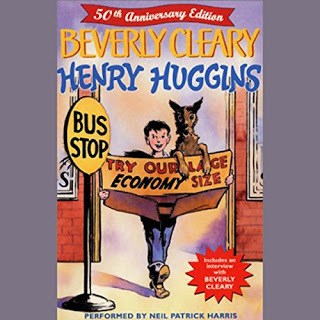
My next favorite mentor author is Kate DiCamillo. The language of her writing is what draws me to her books, especially her book The Tiger Rising. DiCamillo is of course a master at telling wonderful stories, but her stories go well beyond just being amazing stories. When she tells a story, she creates that story by carefully choosing words and then masterfully putting those words together in such a way that the result is almost like music. Because of this, reading her stories aloud is almost magical. Her writing takes story and language to an entirely different level, and it has inspired to strive to reach for that in my own work.
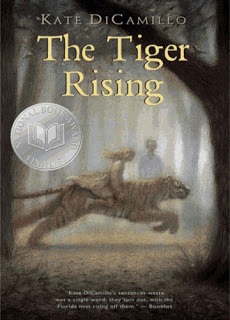
The last author I'd like to highlight is Eleanor Estes. Her book, The Hundred Dresses is an "oldie" but goodie. It has taught me how a story does not need to be complex in order for it to have a huge, lasting, emotional impact on readers. Her use of character, setting, and language are simple and straightforward, but the themes and emotional core of her story run long and deep. It is nothing short of true brilliance. I only hope my writing could come close to making such a lasting impact on the lives of young readers.
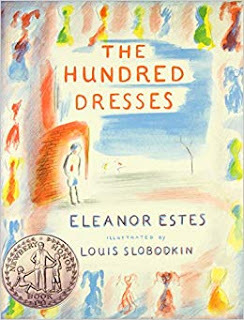
Happy Reading & Writing,
Nancy
I'll start with a childhood favorite - Beverly Cleary. I read her books when I was a child, read them to my students when I was a teacher, and recommended them to children when I was a librarian. And why did I find her writing so especially inspiring? The answer is twofold: characters and setting. Her relatable characters are so much like me, and the settings she creates for them comes alive on the pages of her well-loved books. The worlds Cleary created appealed to me so much, that when I was young, I wished I lived on Klickitat Street with Henry, Beezus, and Ramona. All those "book worlds" gave me a wonderful foundation for creating the characters and settings in the books I now write.

My next favorite mentor author is Kate DiCamillo. The language of her writing is what draws me to her books, especially her book The Tiger Rising. DiCamillo is of course a master at telling wonderful stories, but her stories go well beyond just being amazing stories. When she tells a story, she creates that story by carefully choosing words and then masterfully putting those words together in such a way that the result is almost like music. Because of this, reading her stories aloud is almost magical. Her writing takes story and language to an entirely different level, and it has inspired to strive to reach for that in my own work.

The last author I'd like to highlight is Eleanor Estes. Her book, The Hundred Dresses is an "oldie" but goodie. It has taught me how a story does not need to be complex in order for it to have a huge, lasting, emotional impact on readers. Her use of character, setting, and language are simple and straightforward, but the themes and emotional core of her story run long and deep. It is nothing short of true brilliance. I only hope my writing could come close to making such a lasting impact on the lives of young readers.

Happy Reading & Writing,
Nancy
Published on January 20, 2020 07:00
January 19, 2020
My Mentor, My Friend
“When it came time to go for my writing dream, I knew there was nothing I could say to calm the youngest parts of me, who feared yet another disappointment. So I had two choices: I could sit with her forever in that dreamless world, or I could pick her up with compassion, and carry her along with conviction, and prove to her that not all stories have sad endings.” -Sandra Kring
I am truly blessed that one of my favorite authors, Sandra Kring, is also one of my truest and kindest friends. We met in a book interview – her latest novel about to hit the shelves, and me a journalist.
I had my own childhood aspirations at the time as I sat behind that newspaper reporter desk. I always had. To write a novel. My attempts to fulfill that dream had been weak and half-hearted, afraid to try.
Sandra would later become my first – and one of my best ever – mentors. Both in writing, and in my life.
It’s true childhood me was terrified to try. Terrified to fail. I’d write a sentence or a chapter or two then destroy it. I never told anyone. I didn’t want them to laugh at me, or judge me if or when my writing never went anywhere.
A change in life circumstance scared me beyond anything my own personal failure ever could. Suddenly, failing at something like writing a book was the least thing that could punch the wind from my lungs. I wrote. I wrote and wrote and wrote until I had my first novel. Then the next. And the next.
It was Sandra who read my first – really bad – attempts at a first manuscript. It was Sandra who stood by as I honed my writing and learned more and got better. She was there as I queried my first agents, signed my first book deal, stood at the podium for my first-ever book reading.
There are a lot of things in life to be afraid of. Making friends, and trying your hardest to make your dreams come true, shouldn’t be one of them.
Thank you, Sandra.
Happy reading!
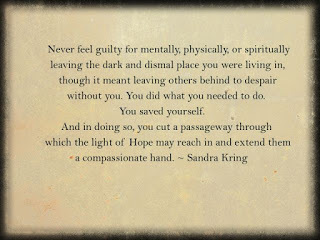
I am truly blessed that one of my favorite authors, Sandra Kring, is also one of my truest and kindest friends. We met in a book interview – her latest novel about to hit the shelves, and me a journalist.
I had my own childhood aspirations at the time as I sat behind that newspaper reporter desk. I always had. To write a novel. My attempts to fulfill that dream had been weak and half-hearted, afraid to try.
Sandra would later become my first – and one of my best ever – mentors. Both in writing, and in my life.
It’s true childhood me was terrified to try. Terrified to fail. I’d write a sentence or a chapter or two then destroy it. I never told anyone. I didn’t want them to laugh at me, or judge me if or when my writing never went anywhere.
A change in life circumstance scared me beyond anything my own personal failure ever could. Suddenly, failing at something like writing a book was the least thing that could punch the wind from my lungs. I wrote. I wrote and wrote and wrote until I had my first novel. Then the next. And the next.
It was Sandra who read my first – really bad – attempts at a first manuscript. It was Sandra who stood by as I honed my writing and learned more and got better. She was there as I queried my first agents, signed my first book deal, stood at the podium for my first-ever book reading.
There are a lot of things in life to be afraid of. Making friends, and trying your hardest to make your dreams come true, shouldn’t be one of them.
Thank you, Sandra.
Happy reading!

Published on January 19, 2020 04:41
January 18, 2020
Learning from Literary Mentors . . . at Their Archives
Most authors grow in our craft by studying the works of our most admired literary predecessors. We read their published books with writers' eyes, trying to understand their creative choices. Oh, wouldn't it be wonderful to be able to peer over their shoulders as they wrote? To trace their creative journey step by step?
Well, actually, we can, by making a pilgrimage to the archives where their manuscripts, correspondence, speeches, and other treasures are housed.
Recently I've twice given myself the treat of spending a week poring over the papers of a beloved author.
My first adventure was at the Archives & Special Collections of the Thomas J. Dodd Research Center at the University of Connecticut. There I did research on Eleanor Estes, who was festooned with Newbery accolades at the middle of the last century, with Newbery Honors three years in a row (for The Middle Moffat, Rufus M. and The Hundred Dresses), culminating in the Newbery Medal for Ginger Pye.
My second adventure was at the Kerlan Collection at the University of Minnesota, which contains the papers of more than 1700 children's book authors and illustrators (including my own). There I did research on my favorite children's author in the whole world, Maud Hart Lovelace, author of the Betsy-Tacy series, published in the 1940s and 1950s.
Both times I funded my travel with grants. Indeed, the Kerlan Collection even gives a grant (The Ezra Jack Keats/Kerlan Memorial Fellowship) each year to "a talented writer and/or illustrator of children's books who wishes to use the Kerlan Collection for the furtherance of his or her artistic development."
So what did I learn as I pored over Maud Hart Lovelace's papers?
A lot.
Even though her books are heavily autobiographical, I saw the meticulous attention she gave to getting every historical detail right: pages of notes from past issues of Ladies Home Journal on current slang, changing fashions, celebrity mentions, and "New Books Worth Reading"; letters to childhood friends peppered with questions (e.g., "What were your religious beliefs about the time you were a sophomore in college? Did college work any great change in them?"), lists of birds of Minnesota (by month), histories of local churches, "verses and wise sayings", and more. I was humbled to see how hard she worked on the stories that read as if they were effortlessly recalled from memory.
I learned about the values that shaped what and how she wrote. In one letter, to a friend who was going to appear in fictional form in one of her books, she promised, "I can assure you that . . as in the previous Betsy-Tacy books . . . all the characters with any resemblance to actual persons, living or dead, will be handled with loving kindness." With a jolt, I realized that's what I aspire to in my books as well: to portray ALL my characters with loving kindness.
Above all, I felt inspired just to be in her company, honored to be part of a tradition of authors writing for young readers, trying with all our hearts to give them the best books we possibly can.
I left wanting to be a better writer.
I left wanting to be a better person.
So: if you have a beloved mentor author, seek out their papers. It's a wonderful way to join with them in timeless fellowship.
Well, actually, we can, by making a pilgrimage to the archives where their manuscripts, correspondence, speeches, and other treasures are housed.
Recently I've twice given myself the treat of spending a week poring over the papers of a beloved author.
My first adventure was at the Archives & Special Collections of the Thomas J. Dodd Research Center at the University of Connecticut. There I did research on Eleanor Estes, who was festooned with Newbery accolades at the middle of the last century, with Newbery Honors three years in a row (for The Middle Moffat, Rufus M. and The Hundred Dresses), culminating in the Newbery Medal for Ginger Pye.
My second adventure was at the Kerlan Collection at the University of Minnesota, which contains the papers of more than 1700 children's book authors and illustrators (including my own). There I did research on my favorite children's author in the whole world, Maud Hart Lovelace, author of the Betsy-Tacy series, published in the 1940s and 1950s.
Both times I funded my travel with grants. Indeed, the Kerlan Collection even gives a grant (The Ezra Jack Keats/Kerlan Memorial Fellowship) each year to "a talented writer and/or illustrator of children's books who wishes to use the Kerlan Collection for the furtherance of his or her artistic development."
So what did I learn as I pored over Maud Hart Lovelace's papers?
A lot.
Even though her books are heavily autobiographical, I saw the meticulous attention she gave to getting every historical detail right: pages of notes from past issues of Ladies Home Journal on current slang, changing fashions, celebrity mentions, and "New Books Worth Reading"; letters to childhood friends peppered with questions (e.g., "What were your religious beliefs about the time you were a sophomore in college? Did college work any great change in them?"), lists of birds of Minnesota (by month), histories of local churches, "verses and wise sayings", and more. I was humbled to see how hard she worked on the stories that read as if they were effortlessly recalled from memory.
I learned about the values that shaped what and how she wrote. In one letter, to a friend who was going to appear in fictional form in one of her books, she promised, "I can assure you that . . as in the previous Betsy-Tacy books . . . all the characters with any resemblance to actual persons, living or dead, will be handled with loving kindness." With a jolt, I realized that's what I aspire to in my books as well: to portray ALL my characters with loving kindness.
Above all, I felt inspired just to be in her company, honored to be part of a tradition of authors writing for young readers, trying with all our hearts to give them the best books we possibly can.
I left wanting to be a better writer.
I left wanting to be a better person.
So: if you have a beloved mentor author, seek out their papers. It's a wonderful way to join with them in timeless fellowship.
Published on January 18, 2020 15:31



